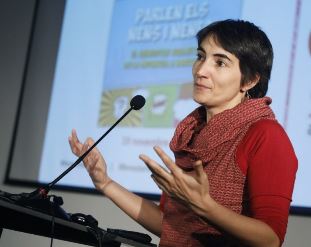On the occasion of the International Day of the Educating City, in my capacity as Commissioner for Education at Barcelona City Council, I would like to reiterate our firm commitment as a city to following the principles of the Charter of Educating Cities.
Twenty-nine years ago, Barcelona promoted and took on the challenge of placing education at the core of its public policies and of highlighting education, in the broadest sense of the word, as a driving force behind social transformation that involves a great diversity of players, times and spaces of the city.
 On this special day, we would like to join forces with the four hundred and ninety Educating Cities across the world in order to give visibility to education and underline it as a lever for change that generates well-being and social cohesion in the city and beyond, as the challenges we face are global.
On this special day, we would like to join forces with the four hundred and ninety Educating Cities across the world in order to give visibility to education and underline it as a lever for change that generates well-being and social cohesion in the city and beyond, as the challenges we face are global.
This year’s slogan, ‘Listen to the City to Transform it‘, reminds us of the pressing responsibility to continue fostering public policies that focus on people, engage them as active players in the process of change, and create educational ecosystems leading to synergies, all with the shared goal of working together for the common good that education is.
Today, here in Barcelona, we’re still firmly committed to an equitable and inclusive Educating City that creates more and better opportunities for lifelong learning. To consolidate this model and undertake it in educational neighbourhoods, we’re faced with the challenge of continuing to connect and bolster the framework of various learning environments and times, beyond school hours, so that these educational opportunities reach and enrich everyone, instead of being a scenario where inequalities are aggravated.
Therefore, it’s necessary to develop and share valuable experiences that bring together facilities, services, projects, associations and citizens in neighbourhoods as educational ecosystems, especially in leisure time. We are committed to an educating city project that helps us to make headway with this empowerment of all citizens, with links and opportunities to keep on learning, to do, to be, to live together and to better take on, and with more creativity, the challenges of personal, social and community life.
This year in Barcelona we’re highlighting the slogan of ‘Listen to the City to Transform it‘ from the Departments of Culture, Education and the Community because we want to work decisively towards healing the fracture between the cultural system and the educational system. The equality-promoting and construction-enabling powers, both individually and collectively, of the right to education in the twentieth century have today been partly diffused by the uncertainties triggered by the present-day change in eras. Uncertainties that affect many aspects of life and social relationships. Uncertainties that also concern the sustainability of life and possible futures.
Now, more than ever before, we need to incorporate the cross-cutting stance of the Educating City to add a series of resources to school-based education that are more focused on creativity, innovation or experimentation, thereby reflecting cultural activities. We need, more than ever before, to incorporate everyday listening in order to recognise and transform ourselves, personally, collectively and as a city.
Maria Truñó
Chairwoman of the International Association of Educating Cities

Cities are facing complex problems that call for creative and innovative solutions. We often think that these can only come from experts, who sometimes have little contact with local reality, but experience shows that the collective knowledge and intelligence of citizens and local players can be the best source of the best answers.
Do we have spaces for listening, reflection and debate on the issues that challenge and concern citizens in our cities? Do these spaces consider the diversity of voices that make up our cities? Do we integrate the knowledge, skills, efforts, creativity and sensitivities of local players and collectives in the quest for solutions to public problems?
Why are we sceptical about opening up channels of shared construction? Why do we see “others” as rivals, opposites or outsiders, even when we know that they could be potential allies and that their incorporation into the project could lead to more effective and legitimate responses?
The Charter of Educating Cities, both in its preamble and in several of its principles (6, 9, 12, 15 and 18), refers to citizen participation as the ideal path towards constructing this city model. Cities are invited to create open and permanent communication channels that help formulate specific and general policy proposals. It’s all about creating spaces where we can meet and learn about each other, talk, swap views, discuss, share concerns and agree on proposals.
That’s why the slogan chosen for this year’s edition of the International Day of the Educating City is «Listen to the City to Transform it«.
At the International Association of Educating Cities, we’re convinced that citizen participation helps us to creatively and effectively address urban problems, enrich projects and bring local governments closer to citizens. Sharing projects and making connections with other players can help us unblock initiatives, overcome obstacles, rise above resistance and debunk prejudices. Participation fosters greater knowledge among citizens of the public authorities and helps engender enthusiasm and commitment.
Governance is not learnt in manuals; it requires courage and mutual trust. It has to be experienced through encounters and active listening.
We, local governments as the closest administration to the citizens, in addition to guaranteeing that citizens take part in public decisions that affect them we should work towards making them feeling as part of the solution. To do this, we need to earn credibility, so this call for participation is neither an end in itself nor a means to legitimise a pre-decided action, but is based on the citizens right to be informed, consulted and to participate, from childhood, in matters that affect them all.
We invite the Educating Cities to mobilise the existing capacities in their municipalities and to launch processes of collaboration, co-creation, and co-participation, which feature the diversity of groups that make up the city. We’re convinced that this feedback will be key to building trust, creating a sense of belonging and jointly constructing more inclusive, participatory and educating cities.
Marina Canals Ramoneda
General Secretary of the International Association of Educating Cities